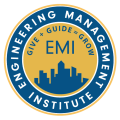Designing your ideal engineering career…. This post is based on an interview I did with Jessica Smith, a younger engineer working as a transportation planner at the Metropolitan Planning Organization (MPO) in Fairbanks, Alaska. In
Blog
Ambition is Good
Lay to rest the debate on whether ambition is good or bad. It’s good. If it take’s a motive force such as ambition to develop new technologies, advance science, or explore new forms of art
I have had the pleasure of providing career-coaching services to several engineers recently who are considering and seeking advice for successful geographic relocation in their engineering careers. Therefore, I decided to write a series of
An engineer recently asked me – How important is the way you dress in respect to your reputation and credibility? I thought it was a great question and one that many people don’t ask themselves
Featured Guest Blogger: Author of the Early Financial Freedom blog When Anthony asked me to be a guest blogger, I jumped at the offer since I have so much in common with his distinguished audience.
How is Technology Affecting Engineering Career Development and What Should We Do About It?
In one of my last posts I talked a lot about how everyone is in a rush these days between the technology and tight budgets; everyone wants everything to be done yesterday. The point of
An Effective To-Do List Can Both Increase Productivity and Reduce Hours Worked in Your Engineering Career
Through our Institute for Engineering Career Development, I have worked with many engineers on a one-on-one basis providing Engineering Management Instituteing and guidance, and the two things that almost all of our members ask for
12 Rules of Zen Monks that may Help You Reduce Stress and Improve Quality in Your Engineering Career
Like many professions today, engineering can be a stressful profession due to the project deadlines, shrinking budgets, and client demands. In this post I want to provide some principles that Zen monks follow, and how
The other day I was speaking with one of my clients who is a consulting engineer and also the owner of a small consulting engineering company. In his line of work, he is often called
I have received requests for advice from many recent engineering graduates for recommendations on how to get their first job, so I thought I would write this post to share some recommendations for everyone.: 1.
The Importance of Computer Technology in Your Engineering Career
This is a guest blog by Nancy Evans One might think that computers and engineering are distinct technological pursuits, as people often equate engineering with large macroscopic projects while computers are seen as producing effects
What do you usually think about how you would like to finish your engineering career? Would you like to finish your engineering career as an expert in your profession but without personal experience? Today we
Time Leadership
Unlike money or aptitude, time is the one commodity that every person on earth has the exact same amount of each day. Most expend an amazing amount of effort trying to expand this non-renewable resource.
Overcoming Friction
Friction is the natural worlds way of holding back movement of an object or wearing that object down. Whether it’s the viscous effects of oil in an engine or the drag over an aircraft’s wing,
Selecting an Engineering Company: Does Size Matter?
Last week I attended the 11th annual ASCE Younger Member CEO forum at Columbia University in New York City. The topic for the evening was: Selecting an Engineering Company: Does Size Matter? There was a
How to Pass Any Test in Your Engineering Career
This is a guest post by William Merunka, EIT, LEED AP. While we may not like it, we face many tests in our engineering career. These may be exams for specific certifications, a test of your





